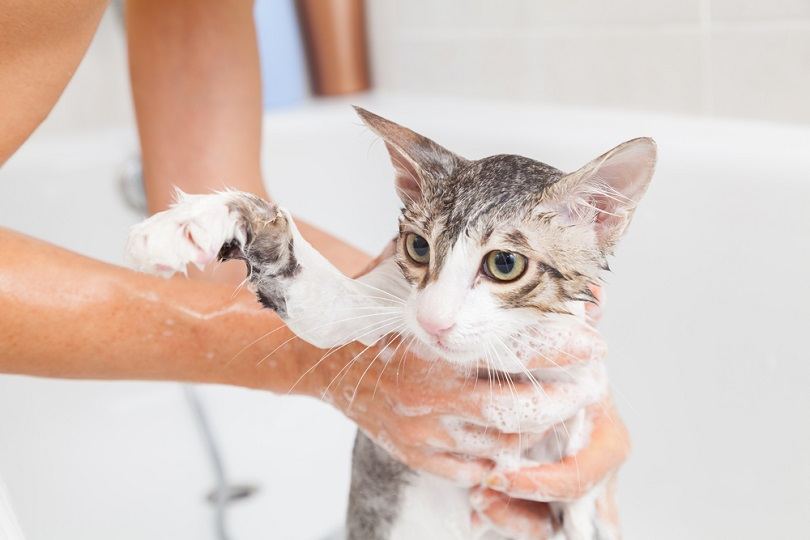
Fungal skin infections are surprisingly common in cats. If your cat has a skin infection, you should always take them to the vet for proper diagnosis. Once the vet has identified the cause, bathing your cat with special medicated shampoo is a great option to treat the infection at home yourself.
Medicated antifungal shampoos typically contain ingredients that kill or prevent the growth of whatever fungus is affecting your cat. If you’ve decided to tackle your feline’s skin problem this way (with your vet’s approval), here are the best antifungal shampoos, with reviews of each.

A Glimpse at Our Favorites in 2024
| Image | Product | Details | ||
|---|---|---|---|---|
| Best Overall |
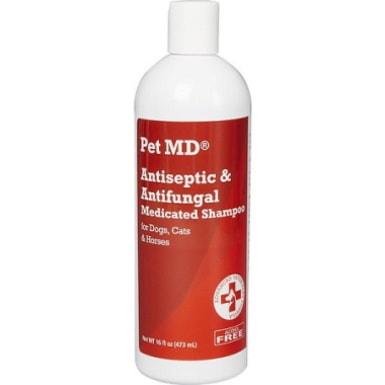 |
Pet MD Antiseptic & Antifungal Medicated Dog, Cat & Horse Shampoo |
|
Check Price |
| Best Value |
 |
Veterinary Formula Clinical Care Antiseptic & Antifungal Shampoo |
|
Check Price |
| Premium Choice |
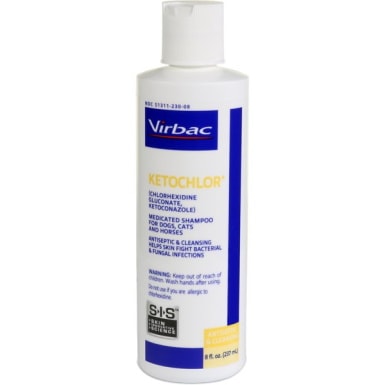 |
KetoChlor Medicated Shampoo for Dogs & Cats |
|
Check Price |
| Best for Kittens |
 |
Vetnique Labs Dermabliss Medicated Shampoo |
|
Check Price |
 |
Pet MD Micoseb-CX Anti-Fungal Medicated Pet Shampoo |
|
Check Price |
The 10 Best Antifungal Shampoos for Cats
1. Pet MD Antiseptic & Antifungal Medicated Dog, Cat & Horse Shampoo — Best Overall

| Active Ingredients: | Chlorhexidine gluconate (2%), ketoconazole (1%) |
| Frequency of Use: | Two to three times per week for 4 weeks, then once per week |
| Good for: | Hot spots, ringworm, acne, cuts, abrasions, insect bites |
The best overall antifungal shampoo for cats is Pet MD Antiseptic & Antifungal Medicated Dog, Cat & Horse Shampoo. This can treat fungal and bacterial skin infections. The active medicinal ingredients are chlorhexidine gluconate, which combats bacterial infection, and ketoconazole, which kills or prevents the growth of fungus. It deodorizes your cat’s skin and fur and is soap free to prevent further skin irritation.
This shampoo is recommended for treating hot spots caused by scratching and biting, as well as ringworm and acne. But, it can also be used to treat cuts and abrasions and speed up healing before they become infected. You can use it up to three times per week for 4 weeks or based on specific instructions from your vet. The only downside is that it may affect topical flea and tick treatments depending on the specific treatment, so make sure you follow the instructions for both treatments in order to increase their effectiveness when used together.
2. Veterinary Formula Clinical Care Antiseptic & Antifungal Shampoo — Best Value

| Active Ingredients: | Benzethonium chloride, ketoconazole, aloe vera, lanolin |
| Frequency of Use: | Twice weekly until clear, then once weekly |
| Good for: | Bacterial pyoderma, allergic and fungal dermatitis, ringworm |
The best antifungal shampoo for cats for the money is Veterinary Formula Clinical Care Antiseptic & Antifungal Shampoo. This shampoo contains ketoconazole to treat fungal infections and benzethonium chloride, which can treat bacteria, fungi, and viruses. Since medicated shampoos can sometimes be harsh on skin that is already irritated, we also like that this shampoo also contains aloe vera to help soothe irritation and lanolin to help moisturize dry skin.
This budget-friendly option also works with topical flea and tick treatments. It works best at treating bacterial pyoderma, a condition that causes large sores on the skin, as well as dermatitis caused by an allergic reaction or a fungus. It is also effective against ringworm. The downside is that it can’t be used on kittens less than 12 weeks old.
3. KetoChlor Medicated Shampoo for Dogs & Cats — Premium Choice

| Active Ingredients: | Chlorhexidine gluconate (2.3%), ketoconazole (1%) |
| Frequency of Use: | Depends on the condition |
| Good for: | Bacterial and fungal skin infections |
We like KetoChlor Medicated Shampoo for Dogs & Cats because it can be used to treat a variety of bacterial and fungal skin infections, even those that are less common. It is a premium product so it’s pricey, but it’s created by Virbac, a leader in veterinary dermatology. It’s also developed with skin innovative science, which means that it not only treats the infection but also improves your cat’s skin and coat and neutralizes odors in addition to promoting natural microbial defenses in your cat’s skin.
This shampoo has a pleasant mountain flower scent and has no age restrictions, so it should be safe to use on young kittens. It does not require a prescription, but the exact frequency of use just depends on the specific skin condition and vet recommendations. It’s a good idea to have a vet diagnosis and prescription before using this product. That way, you can be sure that it will be effective at treating whatever condition your cat has.
4. Vetnique Labs Dermabliss Medicated Shampoo Anti-Bacterial & Anti-Fungal Medicated Dog & Cat Shampoo – Best for Kittens

| Active Ingredients: | Chlorhexidine gluconate (2%), ketoconazole (1%) |
| Frequency of Use: | Two to three times per week until the skin clears up |
| Good for: | General bacterial and fungal skin infections |
Vetnique Labs Dermabliss Medicated Shampoo Anti-Bacterial & Anti-Fungal Medicated Dog & Cat Shampoo is great for cats of all ages, and that includes kittens. However, it’s always a good idea to ask your vet before using any kind of medicated product on a kitten even if the product says it’s safe. The formula of this shampoo is very similar to other antifungal shampoos, as it contains chlorhexidine and ketoconazole to treat general skin infections caused by bacteria and fungi.
One specific reason that we like this shampoo for kittens is that it is soap-free, so it won’t create additional skin irritation. Skin infections can also result in unpleasant odors, but this shampoo helps to deodorize your cat or kitten’s fur in addition to treating the infection. It may wash off some topical flea and tick medications as well, so make sure to read the instructions carefully on the flea medication and wait the recommended time before bathing your cat.
5. Pet MD Micoseb-CX Anti-Fungal Medicated Pet Shampoo

| Active Ingredients: | Chlorhexidine gluconate (2%), miconazole nitrate (2%) |
| Frequency of Use: | Two to three times weekly until skin clears up |
| Good for: | Fungal and bacterial infections, ringworm, dermatitis, mange, hair loss, scaly skin |
In addition to treating fungal infections, Pet MD Micoseb-CX Anti-Fungal Medicated Pet Shampoo can help treat almost any skin condition that is afflicting your cat. The main ingredient, miconazole nitrate, is specifically designed for killing fungi and preventing their growth, but this shampoo can also help clear up mange, dermatitis, and hair loss.
This shampoo is fragrance free, so although it may not deodorize, it can help prevent further irritation often caused by fragrances. It’s also more affordable than some of the other products we’ve reviewed so far. The only other downside is that it may not deodorize as well as other shampoos.
6. Jungle Pet Cat & Dog Medicated Shampoo

| Active Ingredients: | Chlorhexidine gluconate (2%), ketoconazole (1%) |
| Frequency of Use: | Two to three times per week for 4 weeks |
| Good for: | Hot spots, ringworm, itching, irritation |
Jungle Pet Cat & Dog Medicated Shampoo is a vet-approved formula for treating fungal infections and works particularly well for treating hot spots and ringworm, as well as reducing itching and irritation. It uses the same two medications that many other antifungal shampoos do, so even if your cat doesn’t have one of the previously mentioned conditions, it should still work well for treating whatever fungal infection they might have.
This shampoo has a pleasant cucumber melon scent, but it is an artificial fragrance that may cause additional irritation in some cats. It’s very affordable, though, and is a much cheaper alternative than some other shampoos that do the exact same thing as this one. It doesn’t specifically say whether it is safe to use on kittens, though, so it’s best to consult your vet before doing so.
7. Alpha Paw Antibacterial & Antifungal Medicated Dog & Cat Shampoo

| Active Ingredients: | Chlorhexidine gluconate (2%), ketoconazole (1%) |
| Frequency of Use: | Two to three times a week for 4 weeks |
| Good for: | Fungal infections, ringworm, pyoderma, mange, hot spots |
Alpha Paw Antibacterial & Antifungal Medicated Dog & Cat Shampoo is another product that is great for treating a variety of conditions in addition to fungal infections that may be affecting your cat. It can also help kill mites, though it may not prevent them from coming back. It’s best to only rely on this product to treat skin infections and not as a mite treatment.
This formula is soap free and paraben free, so it won’t cause additional irritation for your pet. It also helps to moisturize and deodorize your cat’s skin, as well as helping to condition your cat’s fur. It does have a cucumber melon scent, so it’s artificially fragranced. It also doesn’t say whether it is safe for kittens, so it’s best to consult with a vet first if you do have a kitten with a skin infection.
8. VetWELL Ketoconazole Chlorhexidine Skin Infections, Growths, Abrasions, Acne, & Hot Spots Oatmeal & Aloe Mint Scent Medicated Dog & Cat Shampoo

| Active Ingredients: | Chlorhexidine gluconate (2%), ketoconazole (1%) |
| Frequency of Use: | Two to three times a week for 4 weeks |
| Good for: | Fungal infections, abrasions, acne, hot spots |
The active ingredients in VetWELL Ketoconazole Chlorhexidine Skin Infections, Growths, Abrasions, Acne, & Hot Spots Oatmeal & Aloe Mint Scent Medicated Dog & Cat Shampoo are the same as they are in many other shampoos, and this product is also used to treat many of the same conditions. But what we like about it is that it contains oatmeal and aloe vera to help soothe and moisturize your cat’s skin, since many skin infections can cause irritation and redness.
This shampoo can also be used on kittens as long as they are over 12 weeks old. This shampoo also has a light mint fragrance. However, it doesn’t say whether the fragrance is natural or artificial, as artificial fragrances can sometimes cause additional skin irritation. It does say the fragrance is peppermint but does not specify if the fragrance is natural or artificial. Mint can be toxic to cats if ingested, but you shouldn’t allow your cat to ingest a medicated shampoo regardless, so with that said, this product is safe for cats as long as it is used as intended.
9. Dechra Mal-a-ket Antibacterial and Antifungal Shampoo for Dogs, Cats, and Horses

| Active Ingredients: | Chlorhexidine gluconate (2%), ketoconazole (1%) |
| Frequency of Use: | As directed by a veterinarian |
| Good for: | Fungal and bacterial infections |
Dechra Mal-a-ket Antibacterial and Antifungal Shampoo contains chlorhexidine and ketoconazole, but the company doesn’t specify exactly what conditions it can treat. This means you’ll need to connect with your vet to ensure that this combination will be suitable for your feline’s skin condition. This is a gel formula and it is unscented, so it shouldn’t cause any irritation that soap and artificial fragrances can sometimes cause.
One downside to this product is that it is expensive compared to SOME other products that are more affordable and contain the same ingredients. There’s also less product for the price, so it isn’t the best value. However, most users of this product do agree that it helped clear up their pet’s skin condition, including helping reduce itching, scratching, and biting due to irritation.
10. DDouxo S3 PYO Antiseptic Antifungal Chlorhexidine Dog & Cat Shampoo

| Active Ingredients: | Chlorhexidine gluconate (3%), ophytrium (0.5%) |
| Frequency of Use: | As directed by a veterinarian |
| Good for: | Fungal and bacterial infections |
Douxo S3 PYO Antiseptic Antifungal Chlorhexidine Dog & Cat Shampoo is a little different from other products on this list as far as ingredients. This shampoo contains ophytrium instead of ketoconazole. Ophytrium is a natural plant extract that supports the skin defenses and microflora instead of chemical antifungal medicine, so although it can treat fungal infections, it may not be quite as effective as ketoconazole. It will, however, help restore the skin’s natural barrier, and it can make your cat’s fur silky and shiny.
The instructions recommend using one pump of this shampoo for every 4 pounds of your cat’s weight. With that being said, larger cat breeds may require more shampoo, so you may go through it a lot faster. It’s also pricey compared to the amount of product that you get. It contains a coconut and vanilla hypoallergenic fragrance, so it shouldn’t cause an allergic reaction or additional irritation. However, some users describe the smell as overpowering. Overall, this product is a great choice if you prefer products that contain natural ingredients over chemical ones.

Buyer’s Guide: How to Choose the Best Antifungal Shampoos for Cats
Now that you’ve seen our reviews of the best antifungal shampoos, you may have some questions about some of the ingredients in the shampoos and whether they are actually effective at treating skin infections. That’s why we’ve created this buyer’s guide with some additional information you may be interested in.
Are Antifungal Shampoos Effective?
When it comes to the health of our pets, there are some conditions that just can’t be treated at home. However, when it comes to skin infections caused by a fungus, they usually can be treated at home by bathing your cat regularly with an antifungal shampoo.
That said, it may still be necessary to consult your vet about any skin conditions that your cat may have. Even though most antifungal shampoos contain many of the same active ingredients, some shampoos may be more effective at treating certain fungal infections than others. How often you use the shampoo can also be determined by what type of fungal infection your pet actually has.
Plus, your vet will likely have plenty of experience working with fungal infections and be familiar with any other conditions your cat may have. They may even suggest that you treat the condition at home and can recommend specific shampoos that have worked well in their experience. They can also offer tips on how to bathe your cat successfully, since adult cats, in particular, can be hard to bathe.
How Do Antifungal Shampoos Work?
You probably noticed that most of the shampoos on this list were antiseptic/antibacterial and antifungal. That’s because some bacterial infections and fungal infections can look pretty similar, and it can be hard to determine exactly what’s causing the infection. Plus, skin conditions can also form lesions and sores on your cat’s skin, which can further become infected with bacteria if they are left untreated.
Because of this, antifungal shampoos often contain medications that are designed to kill both fungi and bacteria. One of the active ingredients in every one of the products mentioned is chlorhexidine gluconate. This is an antiseptic agent that is designed to kill bacteria and is often used in mouthwash or to treat gingivitis. But it can also be used to treat skin conditions caused by bacteria because it kills the bacteria.
The other main ingredient in most of these shampoos is ketoconazole, a medication that is used to treat many common fungal diseases and yeast infections. There are other antifungal medications used, but they all have the same basic function of killing or preventing the growth of whatever fungus is causing the infection.
The antiseptic and antifungal medications work together to treat the infection, and as the infection clears up, so do the signs associated with it. A lot of the skin issues that cats experience are the result of your cat scratching and biting at their skin because it itches or feels uncomfortable.
This can lead to skin lesions, dry skin, or even patchy fur and hair loss. As the medicine starts to kill the fungus, your cat won’t feel as itchy and uncomfortable. They won’t bite and scratch as much, causing the overall condition of their skin to improve. Other ingredients, such as aloe or oatmeal, may also be added to help moisturize and soothe the skin as it’s healing, but not all antifungal shampoos have these ingredients.
How Do Cats Get Fungal Infections?
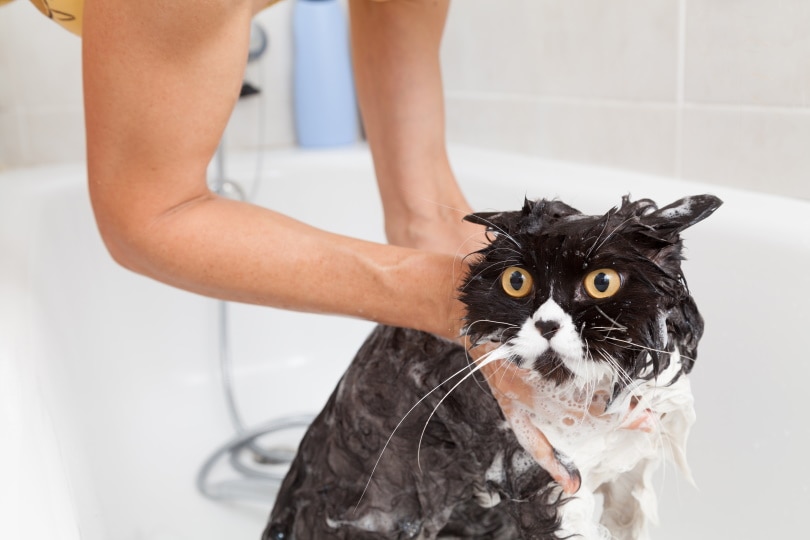
Fungal infections of the skin in cats are actually quite common, especially for cats who spend a lot of time outside. A lot of different types of fungi are present in the environment, and many of them are microscopic. Your cat may acquire a fungus through direct contact with an infected cat or through the environment, or they may have an existing wound, and the fungus can infect your cat that way.
Cats can also get fungal infections by coming into contact with another animal that has a fungal infection or coming into contact with another animal’s poop. Regardless of how your cat got the infection, the fungus can reproduce in or on your cat’s body, causing localized or widespread infections.
Many cats that get fungal infections are already sick or immunocompromised in some way, but this isn’t always the case. Plus, there are some other fungal infections more commonly seen in cats than others. Species of fungus that cause infections commonly affecting cats include but are not limited to:
Some of these types of fungi are more common in certain areas than others. But with skin infections, clinical signs are presented very similarly. For example, most skin fungal infections tend to cause round or cigarette lesions on the skin, but other signs, such as redness, inflammation, etc., can be caused as a result of your cat scratching and biting at the lesions.
It’s also worth mentioning that just because your cat has lesions on their skin, it doesn’t necessarily mean they have a fungal infection. It could be caused by bacteria, an allergy to something, dermatitis, or even fleas.
Since secondary and mixed infections tend to develop, many medicated shampoos are designed to treat a variety of skin pathogens. But again, it might not be a bad idea to take your cat to the vet to figure out exactly what’s going on and get a more specific treatment plan based on your cat’s needs.
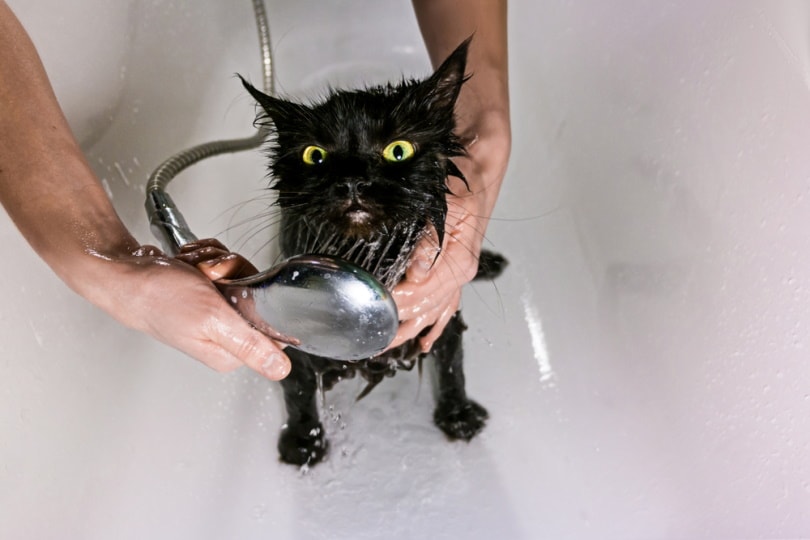
Additional Healthcare Advice
Cat’s fungal skin infections can also be transmitted to humans. Prevention includes the use of personal protective equipment, such as waterproof gloves and long sleeves, while handling an infected cat, and regularly washing your hands. Bedding, plates, towels, and other instruments should be thoroughly cleaned and disinfected with a chlorine solution and ideally dried either at high temperatures and long cycles in the dryer or with direct sunlight. Regularly vacuuming, cleaning, and disinfecting the environment with a chlorine bleach solution diluted 1:10 (1/4 cup in 1 gallon of water) is very important. It is advised to be especially careful if you have a compromised immune system or are taking immune-suppressing medication. Keep children away from infected pets until the infection is completely resolved.
When you're grooming your own pet, choosing the right pet shampoo is half the battle. We recommend Hepper's Colloidal Oatmeal Pet Shampoo line because the all-natural, pet-safe formula does a great job of cleaning and moisturizing while avoiding irritation and itching. These soothing shampoos feature oatmeal and aloe vera and neither of them contain sulfates, phthalates, dyes, or soaps. Your pet will love this shampoo as much as you do! Now you just have to choose which one your pet will love best. Here’s a quick guide to help you choose the right option for your pet’s next bath!


Hepper Colloidal Oatmeal Pet Shampoo
Hepper Waterless No Rinse Pet Shampoo
Natural Ingredients


Made in USA


Safe for cats & dogs


Soothes dry skin


Waterless, no rinsing required


At Pet Keen, we've admired Hepper for many years, and decided to take a controlling ownership interest so that we could benefit from the outstanding designs of this cool cat company!

Conclusion
Fungal infections are common in cats, and in many cases, they can be treated at home with medicated shampoo. If you are going to treat your cat’s fungal infection at home, we like PetMD Antiseptic and Antifungal Medicated Shampoo as the best antifungal shampoo for cats. If you need something more affordable, the best antifungal shampoo for cats for the money is Veterinary Formula Clinical Care Antiseptic and Antifungal Shampoo. Both can treat a variety of skin conditions that may be affecting your cat, but remember that your vet can recommend great antifungal shampoos for your cat’s specific situation too.
Related Reads:
- 8 Home Remedies for Treating Ringworm in Cats
- Cat Chin Mites vs. Chin Acne: How Do I Tell the Difference? Our Vet Explains
Featured Image Credit: 135pixels, Shutterstock










